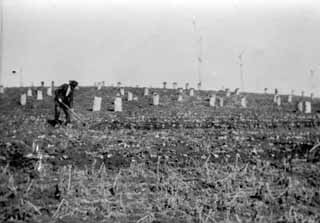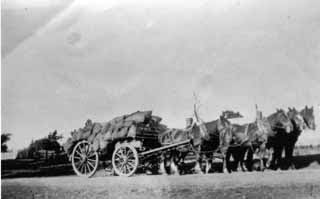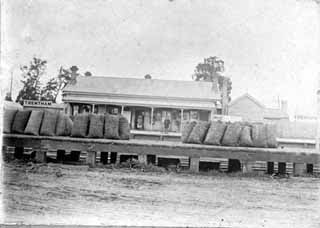They drifted into town independently, alone, odd ramshackle figures, unkempt, with scant belongings. Drifters, seasonal workers, no fixed places of abode. The season was starting.
Combined by the common belief they would pick up work somewhere, they walked. No mobile phones to call ahead, no reference to Google. No support from Government or Employment agencies, just walking from farm to farm accepting knockbacks and moving on until eventually work was assured.
They were known as the Spud Diggers, devoid of families and friends, a loose knit group who didn’t appear to seek company with their fellow workers or anyone in the vicinity. People of few words with pasts unknown.
My parents had a drapery store in the small country town and when the diggers gradually arrived by rail or on foot, having hitchhiked from some other remote town, many would stock up with suitable clothing from Dehnes Drapery Store. Thick flannelette shirts, sturdy work trousers, long johns, thick woollen socks, sturdy jackets, grey blankets, anything that would protect them from the bitter cold whilst they worked through the cruel winter.
My father always treated the men with respect and made sure they were well equipped for the season. If they were unable to pay him at the time he would say, “Fix up the account when you can”. Most did honour this arrangement, some would leave at the end of the season only to return 12 months later and “fix up” their debt.
The diggers living and working conditions were harsh. Working manually with a sturdy shovel they would work in the paddocks from morning till night, edging along the rows of green plants digging into the rich red soil, loosening the dirt to reveal a nest of potatoes which the digger would transfer by hand into large hessian bags. Once full the bags, which would hold 80 lbs of potatoes, were hand sewn with bag needles and twine. The bags were transferred manually by the men.
Day after day from daylight to dusk their labour would continue until the acerage had been harvested. Sun was never seen in the miserable winter. Thick fog hung for days, constant mist covered the area like a grey muslin curtain, dampening the most robust spirit. Temperatures always in single figures, icy frosts and snow would take their toll on the lives of the diggers.
I recall as a child two separate occasions when the body of a digger was found. One poor man was found in a paddock and the word from the local policeman was “The poor bugger froze to death”. The diggers generally lived in huts on the farms. One room slab huts, one everything, one door, one window, if not broken, one small open fireplace, one tin chimney. Minimum building, minimum contents, no running water, no electricity, lanterns or candles the only means of light. Two brothers were found in their hut by the farmer when they hadn’t arrived for work. One brother had died overnight, the other brother, suffering from pneumonia, was transferred to hospital where his clothes had to be cut to be removed, he was spared for a few more months in the luxury of clean sheets, good food and the warmth of care.
Automation and technology have changed farming techniques and work requirements, and the characters and working conditions that machinery has replaced have become memories of the past.
Combined by the common belief they would pick up work somewhere, they walked. No mobile phones to call ahead, no reference to Google. No support from Government or Employment agencies, just walking from farm to farm accepting knockbacks and moving on until eventually work was assured.
They were known as the Spud Diggers, devoid of families and friends, a loose knit group who didn’t appear to seek company with their fellow workers or anyone in the vicinity. People of few words with pasts unknown.
My parents had a drapery store in the small country town and when the diggers gradually arrived by rail or on foot, having hitchhiked from some other remote town, many would stock up with suitable clothing from Dehnes Drapery Store. Thick flannelette shirts, sturdy work trousers, long johns, thick woollen socks, sturdy jackets, grey blankets, anything that would protect them from the bitter cold whilst they worked through the cruel winter.
My father always treated the men with respect and made sure they were well equipped for the season. If they were unable to pay him at the time he would say, “Fix up the account when you can”. Most did honour this arrangement, some would leave at the end of the season only to return 12 months later and “fix up” their debt.
The diggers living and working conditions were harsh. Working manually with a sturdy shovel they would work in the paddocks from morning till night, edging along the rows of green plants digging into the rich red soil, loosening the dirt to reveal a nest of potatoes which the digger would transfer by hand into large hessian bags. Once full the bags, which would hold 80 lbs of potatoes, were hand sewn with bag needles and twine. The bags were transferred manually by the men.
Day after day from daylight to dusk their labour would continue until the acerage had been harvested. Sun was never seen in the miserable winter. Thick fog hung for days, constant mist covered the area like a grey muslin curtain, dampening the most robust spirit. Temperatures always in single figures, icy frosts and snow would take their toll on the lives of the diggers.
I recall as a child two separate occasions when the body of a digger was found. One poor man was found in a paddock and the word from the local policeman was “The poor bugger froze to death”. The diggers generally lived in huts on the farms. One room slab huts, one everything, one door, one window, if not broken, one small open fireplace, one tin chimney. Minimum building, minimum contents, no running water, no electricity, lanterns or candles the only means of light. Two brothers were found in their hut by the farmer when they hadn’t arrived for work. One brother had died overnight, the other brother, suffering from pneumonia, was transferred to hospital where his clothes had to be cut to be removed, he was spared for a few more months in the luxury of clean sheets, good food and the warmth of care.
Automation and technology have changed farming techniques and work requirements, and the characters and working conditions that machinery has replaced have become memories of the past.
Jenny McKenna
April 2017
April 2017
Images from the online photo collection of the Trentham Historical Society -
http://www.trentham.org.au/historical-society/photo-collection





 RSS Feed
RSS Feed
